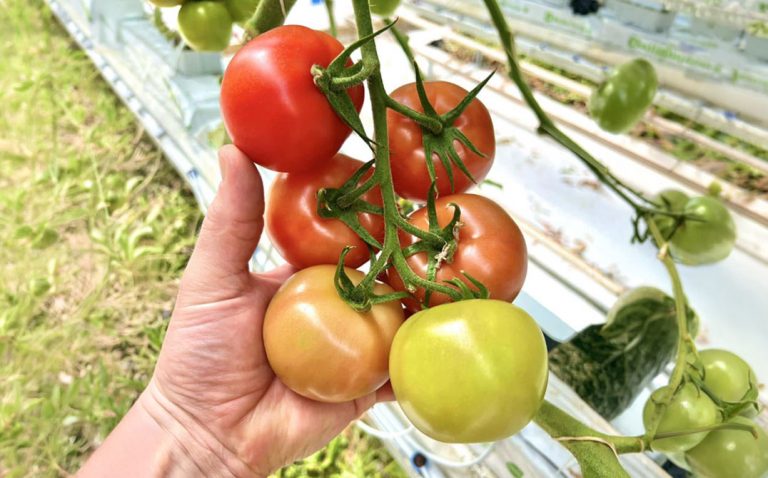Greenhouse growing has revolutionized the way tomatoes are grown, making them consistently flavorful, nutritious, and high quality. Unlike field-grown tomatoes, which are subject to unpredictable weather, soil conditions, and long transportation times, greenhouse grown tomatoes benefit from a controlled environment that optimizes growth, enhances taste, and ensures superior texture. By fine-tuning temperature, humidity, light exposure, and nutrient intake, greenhouse growing allows tomatoes to develop their natural sweetness, juiciness, and aroma, making them a preferred choice for consumers, chefs, and retailers.
Consistent Growing Conditions for Superior Quality
Field-grown tomatoes are at the mercy of nature, making their growth inconsistent due to fluctuations in weather, rainfall, and soil quality. These variables can lead to:
- Uneven ripening
- Watery or mealy texture
- Flavor inconsistencies due to soil nutrient imbalances
In contrast, greenhouse growing provides a highly controlled environment, where factors like temperature, humidity, and CO₂ levels are optimized for consistent growth. This stability in growing conditions results in uniformly ripened, firm, and flavorful tomatoes.
Vine-Ripening for Maximum Flavor
One of the biggest differences between greenhouse grown and field-grown tomatoes is the ripening process. Many commercially grown field tomatoes are harvested early and transported long distances before reaching grocery store shelves. To make them appear ripe, they are often artificially ripened using ethylene gas, a practice that develops color but not flavor.
Greenhouse grown tomatoes, however, are typically vine-ripened, meaning they stay attached to the plant until they reach full ripeness. This extra time on the vine allows tomatoes to:
- Fully develop their natural sugars, creating a sweeter, more robust flavor.
- Retain their firm, juicy texture, making them perfect for fresh consumption.
- Absorb nutrients longer, enhancing their vitamin and antioxidant content.
Since greenhouse grown tomatoes don’t have to endure long transportation times, they can be harvested at their peak ripeness, ensuring better flavor and texture than their field-grown counterparts.
Optimized Nutrient Delivery
The soil quality in traditional farming varies greatly, leading to inconsistencies in the nutrients available to plants. Poor soil can result in bland, nutrient-deficient tomatoes, while overly fertilized soil can produce overly watery fruit with diluted flavor.
Greenhouse growing, especially when using hydroponic and aeroponic systems, eliminates this problem by delivering a precisely controlled nutrient mix directly to the plant’s roots. This allows for:
- Balanced nutrient absorption, ensuring optimal flavor and texture.
- Higher concentrations of beneficial compounds, such as lycopene and vitamin C.
- Less water retention in the fruit, leading to richer, more concentrated flavors.
With controlled feeding systems, greenhouse tomatoes are able to reach their full flavor potential without the unpredictability of traditional farming.
Better Water Management for Enhanced Taste
Water plays a crucial role in the flavor and texture of tomatoes. Field-grown tomatoes often suffer from inconsistent watering patterns, either receiving too much or too little water, which can:
- Dilute their flavor
- Make them overly soft or mealy
- Cause cracking or deformities in the fruit
In contrast, greenhouse growing uses advanced irrigation techniques, such as drip irrigation and hydroponic systems, to provide precisely the right amount of water at the right time. This precision prevents overwateringwhile ensuring the fruit remains firm, flavorful, and nutrient-rich.
Protection from External Stressors
Greenhouse grown tomatoes, however, are protected from harsh environmental conditions, leading to:
- Higher-quality, blemish-free fruit
- A more uniform size, shape, and ripeness
- Less need for chemical pesticides, resulting in cleaner, safer produce
Field-grown tomatoes, however, are exposed to extreme heat, heavy rainfall, strong winds, and soil-borne diseases, all of which can negatively impact their quality. These stressors often result in:
- Sunburnt or cracked tomatoes
- Uneven ripening due to temperature fluctuations
- Increased pesticide use to combat pests and diseases
This controlled protection ensures that every tomato grown in a greenhouse consistently meets premium quality standards.
Sustainable and Reduced Pesticides
Greenhouse grown tomatoes employ sustainable practices that support plant health and are environmentally sustainable. Growers rely on natural allies like lady bugs for pest control and bumble bees for pollination, reducing the need for chemical pesticides and creating a more balanced growing environment. This results in tomatoes that are consistently vibrant, flavorful, and high in quality.
Using hydroponic or aeroponic systems, tomatoes receive a precisely controlled mix of nutrients delivered directly to their roots. This allows for:
- Optimal nutrient absorption for better taste and texture
- Higher levels of lycopene and vitamin C
- Less water in the fruit, for a more concentrated flavor
It’s all part of what makes greenhouse goodness—fresh, flavorful, and grown with purpose.
A Game-Changer for Culinary Creations
The enhanced flavor, juiciness, and texture of greenhouse grown tomatoes make them a top choice for home cooks and professional chefs. Their consistent sweetness and acidity balance make them ideal for:
- Fresh salads and sandwiches, where their natural flavor stands out.
- Homemade pasta sauces, as their rich taste enhances any dish.
- Salsas and bruschettas, where their juiciness adds depth.
- Roasting and grilling, as their firm structure holds up under heat.
Since greenhouse grown tomatoes don’t suffer from the flavor dilution of early-picked, artificially ripened tomatoes, they are a superior ingredient for any dish.
The Future of Flavorful, High-Quality Tomatoes
As consumers demand better-tasting, nutrient-rich, and sustainable food, greenhouse growing is reshaping the tomato industry. By offering vine-ripened, reduced pesticides, consistently high-quality tomatoes, greenhouse growing is setting a new standard for fresh produce. Whether you’re looking for the best flavor, texture, or nutrition, greenhouse grown tomatoes deliver a superior eating experience year-round.




